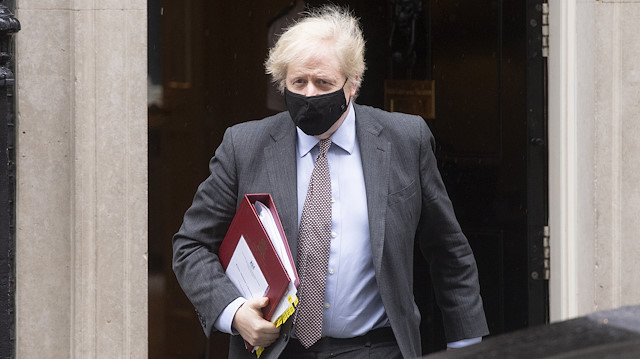Boris Johnson unveils plan to end England COVID-19 restrictions

Prime Minister Boris Johnson sets out 4-stage roadmap to ease restrictions
The UK government on Monday said it will prioritize social contact with loved ones and the reopening of schools over the hospitality sector in its roadmap that will ease England out of its third coronavirus lockdown.
Addressing MPs in parliament, Prime Minister Boris Johnson set out a four-stage plan for the easing of restrictions across England to gradually reopen the nation following three months of closure.
Stage one will involve the reopening of all schools on March 8 as well as the resumption of sports and outdoor activities where up to two people will be allowed to meet in an outdoor setting. From March 29, outdoor gatherings of up to six people or two households will be allowed, including gathering in private gardens.
“Two weeks from today, pupils and students in all schools and further education settings can safely return to face-to-face teaching supported by twice-weekly testing of secondary school and college pupils,” Johnson said.
Stage two will see major sectors of the economy reopening from April 12, including non-essential retail business such as hairdressers, museums, and libraries. Restaurants and pubs offering outdoor entertainment will also reopen as well indoor leisure centers such as swimming pools and gyms.
Abolishing the “rule of six,” stage three will begin from May 17, where up to 30 people will be allowed to gather outside and two households can mix indoors. Cinemas, hotels, and the performing arts as well as sporting events will reopen with the observance of social distancing.
Stage four will see all legal restrictions on social contact removed from June 21, with the remaining sectors of the economy reopened. These include nightclubs, funeral processions, and wedding events.
“With appropriate dedications, we will aim to remove all legal limits on social contact and on weddings and other like events and we will reopen everything up to and including nightclubs and enable large events such as theatre performances above the limits of step three.”
Reklam yükleniyor...
Reklam yükleniyor...
Four conditions must be met at each phase of the lockdown easing: the vaccination program continuing as planned, evidence showing vaccines sufficiently reducing virus deaths and hospitalizations, infection rates that do not risk a surge in hospital admissions, and new mutations that don’t change the dynamic of the lifting of lockdown.
Johnson also released new data showing vaccine usage in the UK is reducing the rate of infections, hospitalizations, and deaths and, importantly, is effective against dominant strains of the virus. He warned, however, that it is inevitable that the easing of lockdown will lead to more cases and deaths.
“The data so far suggests that both vaccines are effective against the dominant strains of COVID-19. Public Health England has found that now dose of the Pfizer-BionTech vaccine reduces hospitalizations and deaths by at least 75% and early data suggests that the Oxford-AstraZeneca vaccine provides a good level of protection,” he said.
On Monday, 10,641 people tested positive, down 11.1% from the week before. There were 178 deaths reported within 28 days of testing positive, a 26.9% fall from the week before.
Over 17.7 million people had been administered a first dose of the vaccine by the end of Feb. 21, with 624,325 receiving their second.
Reklam yükleniyor...
Reklam yükleniyor...







Comments you share on our site are a valuable resource for other users. Please be respectful of different opinions and other users. Avoid using rude, aggressive, derogatory, or discriminatory language.